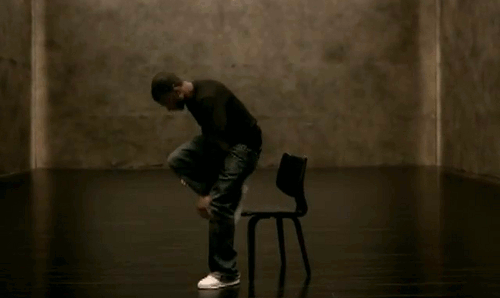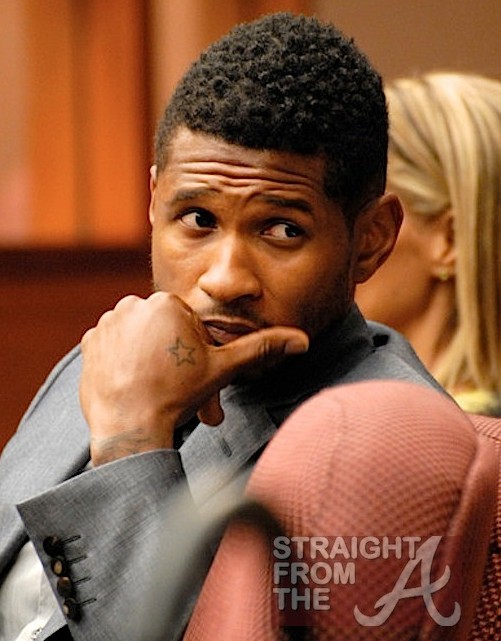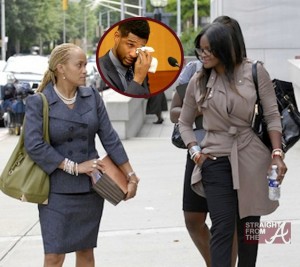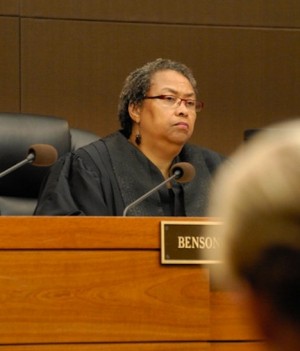Things are about to get really interesting in the custody battle between Usher Raymond and his ex-wife Tameka Foster Glover Raymond.
As you know, there have been many questions raised about the case and the details surrounding the judge’s decision to award primary custody to the busy R&B superstar.
There were also questionable issues brought up about Usher’s attorney’s relationship with the judge who ruled in the case.
[READ: Proof Usher’s Attorney Held Fundraiser for Judge in Custody Battle]
Usher & Tameka returned to court just last week after Tameka’s attorney filed a motion asking for the judge to recuse herself from the case and another requesting a new trial.
Fast forward to last night. A CBS Atlanta News investigative report aired which reveals how some Georgia judges fail to disclose relationships they have with attorneys in open court and while the practice is legal, it raises questions about how fairly the judges dispense justice.
Details + watch video of the explosive investigative report…
In August 2012, Fulton County Superior Court Judge Bensonetta Tipton Lane ruled in Usher Raymond’s favor and awarded custody of the couple’s two sons to singer.
As you know, I sat in the courtroom during several of the appearances and the shocking decision stunned many who knew the details of the case.
[READ: Raymond v. Raymond: 5 Things That Happened In Court… ]
According to Tameka Raymond’s attorney, Lisa West, she learned that Usher’s celebrity attorney, John Mayoue, may have helped Lane get reelected in 2008.
None of the information concerning his hand in the judges campaign was disclosed during the trial and the information was discovered AFTER the decision was rendered in the case.
VIDEO: CBS Atlanta Investigative Report
West said According to campaign finance reports, Mayoue’s law firm donated $1,000 to Lane’s campaign and hosted a fundraising reception that raked in thousands of dollars. According to West, Mayoue also sat on Lane’s reelection committee.
“I would classify the relationship as a special relationship,” said West.
West said she believes Lane should have disclosed that relationship in open court so she has asked for a new trial and for Lane to recuse herself.
Georgia law allows for attorneys to contribute to judicial campaigns but judges have a heavy legal burden to avoid even the appearance of being biased.
Lane isn’t the only judge accused of not revealing special relationships with attorneys. Lane’s colleague, Judge Gail Tusan, also failed to tell Ed Dort that his ex-wife’s attorney, Robert Boyd, sat on her reelection committee
“The final judgment and divorce decree basically financially buried me,” Dort said.
According to records, Boyd donated to Tusan’s campaign days before Dort’s wife filed for divorce.
“There’s no question she was influenced by the attorneys,” Dort said.
Joanna Shepherd Bailey, a professor for Emory University School of Law, said money does influence judicial outcomes.
Shepherd Bailey conducted an extensive study of more than 21,000 State Supreme Court cases and found a strong correlation between judicial campaign contributions and judges’ decisions.
“A $1,000 contribution will increase the likelihood of a judge voting in a particular way by, depending on the case, between 1 percent and 7 percent increase in likelihood,” Shepherd Bailey said.
Some are calling on judges to be more transparent in open court about contributions they receive and relationships they have with attorneys arguing before them.
“There’s no harm in laying all your cards on the table,” said Charles Hall, representative of the Justice At Stake Campaign, a group fighting against money’s influence on courts.
Hall recommends judges be up front about connections they have with parties involved in a case. If there’s any question whether a judge can be fair, then he or she should step aside, Hall said.
Tusan, the judge who presided over Dort’s divorce, denied that she is influenced by contributions to her campaign or attorney’s efforts to help her get elected.
Tusan said she is in full compliance with state law and discloses all campaign contributions as required by state law.
But after Dort launched an online petition calling for Tusan to step aside, she recused herself. READ MORE
Tipton-Lane, the Judge in the Raymond vs. Raymond case, refused to recuse herself from their case and has since ruled that Tameka is to turn over her sons to Usher on November 24th, which is the date that he will officially began serving as “primary” custodian of the boys.
The investigation in this matter continues and the FBI is also reportedly involved in probing judicial misconduct in Georgia. This situation is developing, but clearly there are questions that need to be answered.
Are you surprised by these recent developments?
Well stay tuned… it ain’t over folks!

![Straight From The A [SFTA] – Atlanta Entertainment Industry Gossip & News - Atlanta's Most Reliable Source of Entertainment Gossip!](https://straightfromthea.com/wp-content/uploads/2015/04/sftalogo31.png)

























![Usher Confirms Engagement + Shades Ex-Wife During BET Honors Acceptance Speech… [VIDEO]](https://straightfromthea.com/wp-content/uploads/2015/02/BET-Honors-2015-150x150.jpg)



